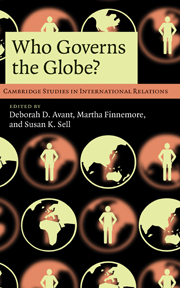Book contents
- Frontmatter
- Contents
- List of figures
- List of tables
- List of contributors
- Preface
- 1 Who governs the globe?
- Part I Authority dynamics and new governors
- Part II Authority dynamics and governance outcomes
- 7 Packing heat: pro-gun groups and the governance of small arms
- 8 Governing the global agenda: “gatekeepers” and “issue adoption” in transnational advocacy networks
- 9 Outsourcing authority: how project contracts transform global governance networks
- 10 When “doing good” does not: the IMF and the Millennium Development Goals
- 11 The power of norms; the norms of power: who governs international electrical and electronic technology?
- 12 “Education for all” and the global governors
- 13 Conclusion: authority, legitimacy, and accountability in global politics
- References
- Index
- Cambridge Studies in International Relations
13 - Conclusion: authority, legitimacy, and accountability in global politics
Published online by Cambridge University Press: 05 June 2012
- Frontmatter
- Contents
- List of figures
- List of tables
- List of contributors
- Preface
- 1 Who governs the globe?
- Part I Authority dynamics and new governors
- Part II Authority dynamics and governance outcomes
- 7 Packing heat: pro-gun groups and the governance of small arms
- 8 Governing the global agenda: “gatekeepers” and “issue adoption” in transnational advocacy networks
- 9 Outsourcing authority: how project contracts transform global governance networks
- 10 When “doing good” does not: the IMF and the Millennium Development Goals
- 11 The power of norms; the norms of power: who governs international electrical and electronic technology?
- 12 “Education for all” and the global governors
- 13 Conclusion: authority, legitimacy, and accountability in global politics
- References
- Index
- Cambridge Studies in International Relations
Summary
Asking questions about who actually does the governing we see in contemporary politics has led us through some rocky terrain, analytically. It required us to define what global governors are (“authorities who exercise power across borders for the purpose of affecting policy”). This, in turn, raised questions about the sources of these authorities and how they change over time. It has also forced us to rethink many of our initial assumptions. When we began this project, we expected to focus on different forms of governors – NGOs, IOs, corporations, even states. These standard categories produced far fewer regularities than we expected. Over the course of our research we became convinced that the key to understanding these governors lay not in their form but in their relationships. Governors' relationships with constituencies and with one another shape how and whether governors become authorities in the first place and how they affect governing outcomes.
Our hope is that these chapters are only the beginning of research on global governors. The framework we developed suggests a research agenda for global politics that has analytical implications for our understanding of multiple authorities in global politics. It has implications for our assessment of the normative value of different arrangements and it has implications for international relations theory. We outline these, in turn, below.
- Type
- Chapter
- Information
- Who Governs the Globe? , pp. 356 - 370Publisher: Cambridge University PressPrint publication year: 2010
- 9
- Cited by

